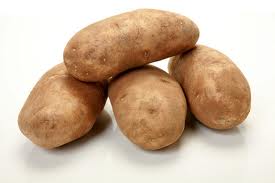The Potato: One of EWG’s Dirty Dozen
By: Connie Rosemont (Only Organic)
The potato is a great food – calorie-dense and rich in nutrients like vitamin B6, vitamin C, potassium and manganese. It is America’s largest vegetable crop: the average American consumes 29 pounds of French fries a year and 142 pounds of potatoes overall.
Alas, the conventional potato tests positive for 35 different pesticides — more pesticides by weight than any other vegetable, according to EWG’s 2014 Dirty Dozen List. Some of these pesticides remain even after peeling and washing. Pesticides found on potatoes by the U.S. Department of Agriculture Pesticide Data Program include:
— Six known or probable carcinogens
— 12 suspected hormone disruptors
— Seven neurotoxins
— Six developmental or reproductive toxins
— Nine honeybee toxins
More potatoes aren’t organic because of production challenges, says Nate Lewis, Crop and Livestock specialist with the Organic Trade Association.
Farmers who raise conventional potatoes take a “kill-down” step just before harvest, spraying their potato fields with an herbicide that kills all the green leafy vegetation. With the leaves gone, the potato goes into a finishing-off process that thickens the skin, rendering it less susceptible to injury and blemishes.
After farmers harvest conventional potatoes, they warehouse them for up to nine months and ship them, as retailers and processing centers need them. Conventional producers apply post-harvest fungicides and sprouting inhibitors during storage to retard the spread of small blemishes and bad spots from one potato. Not surprisingly, these pesticides applied during storage show up most frequently on residue tests.
Organic standards enforced by the USDA bar organic farmers from using most field and storage pesticides. Organic farmers must work harder to store their potatoes for months without fungicides and sprout inhibitors. As a result, they face significantly larger hurdles than conventional producers in large-scale potato farming.
The hurdles of raising storage crops organically on a large scale might consign organic potatoes always to a small niche market. However, buying organic potatoes means that those farmers who decide to try organic potatoes will find a market for their efforts.

